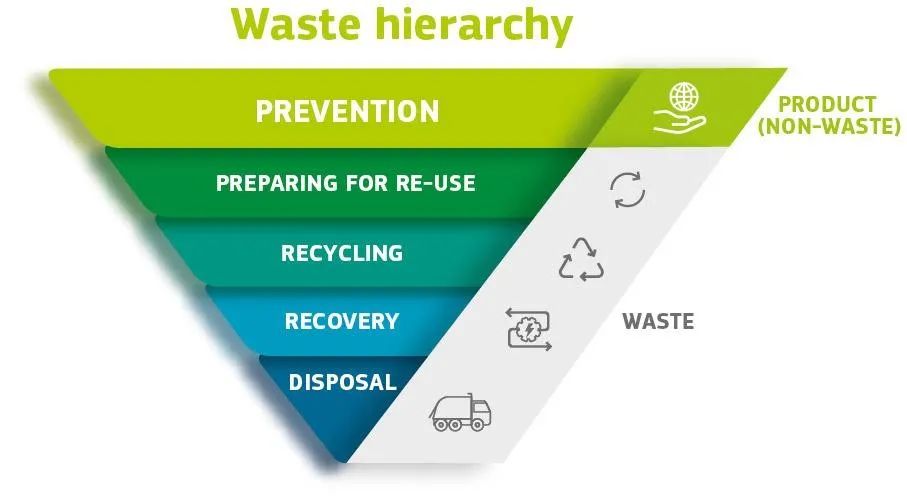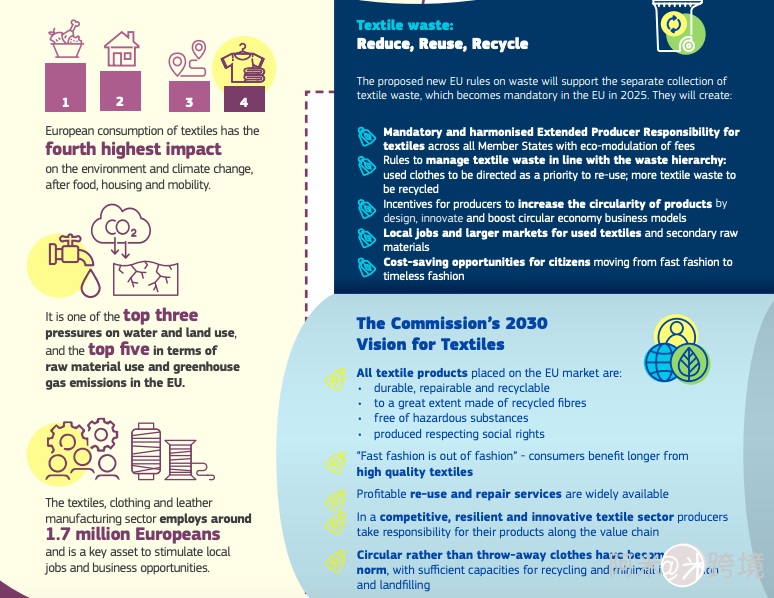Time: 2023.11.8-10 Location: Zhejiang, Ningbo
On July 5, 2023, the European Commission proposed an amendment to the "Waste Framework Directive" focusing on textile waste. This proposal calls for the introduction of Extended Producer Responsibility (EPR) for textiles, which requires producers to be responsible for the entire lifecycle of textiles and supports sustainable management of textile waste within the European Union. This measure will promote the development of textile collection, sorting, reuse, and recycling processes in the EU, aligning with the EU's strategy for sustainable and circular textiles. Strengthening the recycling and reuse of textile waste is expected to create local job opportunities within and outside the EU, while reducing the impact of textile production on natural resources.
Background of the Amendment
The "Waste Framework Directive" is a legal framework for waste management in the European Union. It establishes definitions related to waste management, including waste, recycling, and reprocessing, as well as the priority order and basic concepts of waste management.
According to reports, this is a new initiative by the European Commission to address the significant waste and pollution caused by textile resources. The EU generates about 12.6 million tons of textile waste annually, with clothing and footwear alone accounting for 5.2 million tons, equivalent to 12 kilograms per person per year. However, currently only 22% of post-consumer textile waste is separately collected for reuse or recycling, while the rest is often incinerated or landfilled, imposing a significant burden on the environment and resources.
This proposal fulfills the European Commission's commitment in the EU's strategy for sustainable and circular textiles to introduce measures for coordinating extended producer responsibility rules for textiles and developing economic incentives to make textiles more sustainable and circular.

Proposal Measures
In this new proposal, the European Commission proposes to introduce mandatory and uniform Extended Producer Responsibility (EPR) programs for textiles in all EU member states (EPR programs have already successfully improved waste management for various products such as packaging, batteries, electrical, and electronic equipment). It explicitly states that plastic scrap washing machine manufacturers will bear the cost of managing textile waste, which will also incentivize them to reduce waste and enhance the circularity of textile products by designing better products from the start. The amount manufacturers pay to the EPR program will be adjusted based on the environmental performance of textiles in what is known as "eco-modulation."

The introduction of common Extended Producer Responsibility rules for the EU will also make it easier for member states to implement requirements for separate collection of textiles starting from 2025 under existing legislation. The contributions from manufacturers will be used to invest in the capacity for separate collection, sorting, reuse, and recycling. The proposed waste management rules aim to ensure the classification and reuse of used textiles, prioritizing recycling for textiles that cannot be reused. Social enterprises engaged in textile collection and processing will benefit from more business opportunities and a larger second-hand textile market.
The proposal will also promote research and development of innovative circular technologies for the textile industry, such as fiber-to-fiber recycling.
The proposal also addresses the issue of illegal export of textile waste recycle machine to countries that lack waste management capabilities. The new legislation will clearly define the composition of waste and reusable textiles to prevent the practice of exporting waste under the guise of reuse. This will complement measures taken under the "Waste Transport New Regulation Proposal" to ensure the environmentally sound transportation of textile waste.
Follow-up Measures
The European Parliament and the Council will now review the Commission's proposal for targeted revisions to the "Waste Framework Directive" in the ordinary legislative procedure.